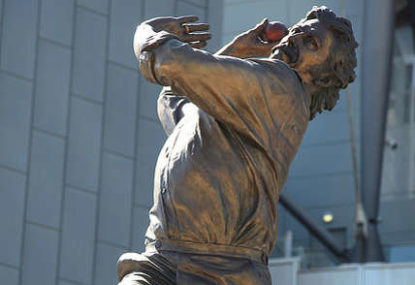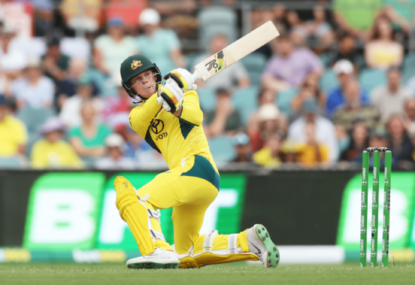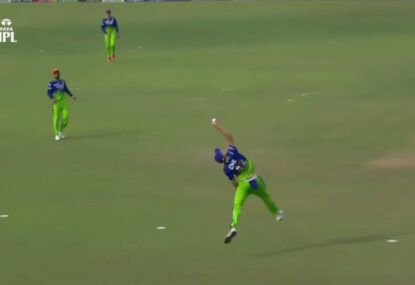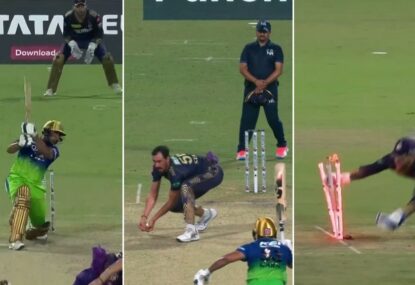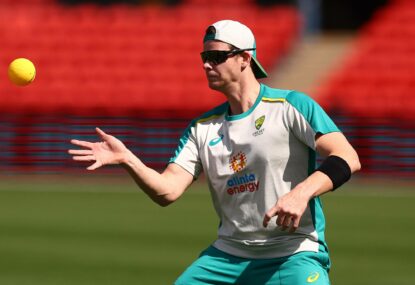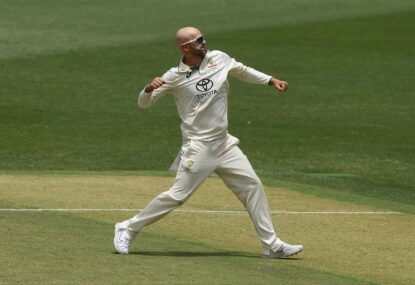The Ashes invariably brings out the best in Australian and English cricket, none more so than the Centenary Test at the MCG in 1977.
It wasn’t just a celebration in the middle, but the largest gathering of former Ashes heroes – 217 of them.
That included the doyen of them all Sir Donald Bradman, Lindsay Hassett, Keith Miller, Ray Lindwall, Neil Harvey, Sam Loxton, Graham McKenzie, Richie Benaud, Bill Lawry, and Ian Chappell
Mixing freely with the Australians were the likes of Harold Larwood, Alec Bedser, Sir Leonard Hutton, Peter May, Cyril Washbrook, Jim Laker, Tony Lock, Freddie Trueman, Brian Statham, Godfrey Evans, and Peter May to name just a few.
It was magic, and a once in a lifetime meeting of the greats in one place and a perfect way to kick-start what was a historic Test.
The first ever Test match was played from March 15-19, 1877, at the MCG with four-ball overs, and Australia won by 45 runs.
The Centenary Test, the 800th in history, was played from March 12-19, 1977, at the MCG with eight-ball overs. Australia won by 45 runs.
The result was the icing on the cake.
But from the first session there was drama when Australia’s classical opening batsman Rick McCosker wore a Bob Willis bouncer that not only broke his jaw in two places, but the ball fell onto McCosker’s stumps, and he was out bowled for just four.
Having been sent into bat by England captain Tony Greig, Australia was all out for only 138 – Australian skipper Greg Chappell top scored with 40, with keeper Rod Marsh’s 28 next best.
England’s most successful bowlers were left-arm spinner Derek Underwood’s 3-16 off 11.2, and medium-pacer Chris Old’s 3-39 off 12.
The packed house was stunned, but came alive very quickly when Australian firebrand Dennis Lillee destroyed England’s batting like a hot knife through butter with 6-26 off 13.3, ably supported by the tangle-footed paceman Max Walker’s 4-54 off 15. England was all out for just 95 – Greig top-scoring with 18.
It looked as though the long-awaited Test was going to be a fizzer, but Marsh, Ian Davis, Doug Walters and David Hookes had other ideas, before McCosker’s courageous return, swathed in bandages.
Davis scored 68, Walters 66, with Hookes having the huge crowd on their feet by carving up Greig’s offies to the tune of five successive fours on his way to a quick-fire 56 in a stunning Test debut.
Once again the crowd rose as one as the heavily bandaged McCosker strode to the crease batting 10 with Marsh in his 70s. McCosker made 25 in helping Marsh to his unbeaten 110, before Chappell declared at 9-419.
But the dramas didn’t finish there as the cheeky Derek Randall played a magnificent innings of 174 and had he stayed a little longer England would have been in with an unlikely sniff of victory.
It was not to be as Lillee was again the destroyer taking 5-139 off 34.4, and leggie Kerry O’Keeffe chimed in with 3-108 off 33.
There were five genuine contenders for man of this mighty match – Rick McCosker for his incredible courage in an era before helmets, chest guards, or arm-guards, Lillee’s match figures of 11-165, Rod Marsh’s unbeaten 110 when Australia needed big runs, David Hookes’ boundary blitz in his brilliant half-century, and Derek Randall’s sensational 174.
Randall got the nod, and no-one complained, he was a fitting award winner in an unforgettable Test.
But little did we know at the time that Kerry Packer, through John Cornell, better known as ‘Strop’, and Austin Robertson, Lillee’s manager, had moved on the Australian and English teams for his World Series Cricket to be.
Mid-year the WSC news broke during the Ashes tour to England in 1977, and cricket was never the same again. Eventually it was for the better, thanks to Packer shaking up the Australian Cricket Board of Control and the MCC.
But nothing can be taken away from the enormity of the Centenary Test.
Those of us who were involved in any capacity will treat that as a privilege for the rest of our lives.





























































































